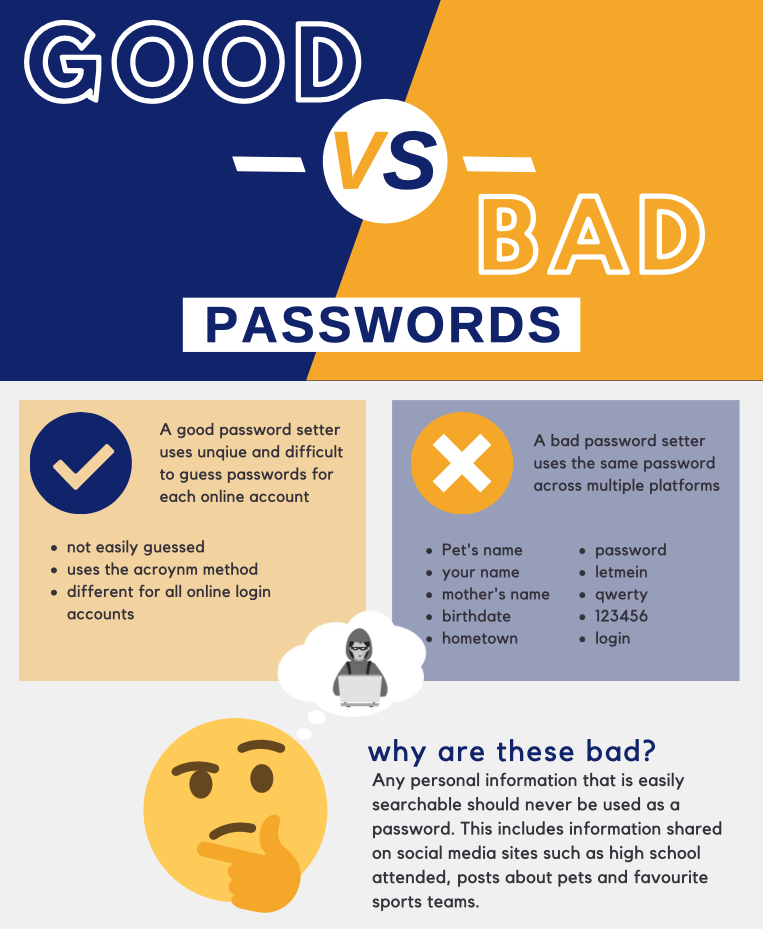

Top six fraud prevention tips.
You work hard for you money, keep it safe with the following precautions.
Keep a clean computer.
Many Canadians are not aware that a major cause of financial loss to consumers occur due to infected devices. These incidents are not covered by financial institutions. As a user of online banking, you are required to use a virus free computer or mobile device. Keeping your devices clean and free of viruses is critical to keeping your finances and personal information safe.
If you suspect your device has been compromised, immediately stop using it for online banking and take it to a professional repair shop immediately for inspection and repair.
Be your own detective, think before you click.
It’s likely that during some point in your life you have received the enticing emails promising riches if you follow the steps they outline. These emails usually come with subject headings such as: “Congratulations! You’ve been specially selected”, “This offer won’t last long” and use language to create a strong sense of urgency so that you don’t miss out.
It’s important to investigate the link or attachments in emails and to be your own detective, never click on links in unknown emails. Always remember that your credit union will never email you a request for your personal passwords, personal information numbers or login information. Legitimate credit unions and other financial institutions will never ask you to follow links to their secure websites in email communication with you.
It’s time for your password to hit the books! A smart password is the best defense for your accounts.
 Think of it like this, your password is your wall of protection from cybercriminals. A password like password123, letmein, password, 12345678 or qwerty are comparable to a sandcastle – weak and easy to destroy.
Think of it like this, your password is your wall of protection from cybercriminals. A password like password123, letmein, password, 12345678 or qwerty are comparable to a sandcastle – weak and easy to destroy.
A password using a combination of letters, numbers and symbols are strong like a brick wall, it will take extreme measures to destroy.
Do you find yourself struggling to create a strong password? Give the acronym method a try. Create your password by building a memorable phrase, for example: iLiC4b0tw! - I love ice cream for breakfast on the weekends!
This password is unique and fun to create, give the acronym method a try when creating your passwords.
Make your online passwords as unique as you are!
No two humans are alike, this rings true for online login passwords. It seems that we need to have passwords and logins for everything these days. As much of a pain this may be, it is extremely important to have unique passwords for each of your online logins, especially for your online banking. If one online account is compromised, the rest of your accounts become extremely vulnerable to also being hacked.
By using the same password for your social media login and your online banking, if your social media password is compromised – it would only be moments until your finances disappear.
Take a moment and think about all of the online logins you have – and which of those share the same password? Set aside some time for some password cleanup and future you will thank you.
Not all Wi-Fi is created equal.
Things that are safe to do on your home Wi-Fi are different from public Wi-Fi. Things to always do on your home Wi-Fi include: online banking, online shopping, accessing personal and sensitive information. Public Wi-Fi is great to use for already logged in social media applications, browsing the web and streaming music or videos.
Since public Wi-Fi is shared with others, there is always the chance that someone is electronically watching your activity looking to steal sensitive information such as login credentials and credit card information.
If you are in a pinch and need to access an app or program that holds sensitive information in public, use your cellular data. Cellular data is always safe and secure.
Stay diligent and be aware of scams.
Anyone emailing you out of the blue with an urgent request should cause suspicion. Cybercriminals can craft a highly realistic email mimicking someone you know. This could be your boss, a friend, a family member, trusted companies such as the CRA or police department.
These scams happen when cybercriminals trick you into believing that they are in fact someone you know and are in need of immediate action. These scams are playing on your existing trust of the individual and the urgency to comply before giving it a second thought.
Don’t let the strong sense of urgency make you do something you’ll regret. Listen to your gut, if something doesn’t seem right, it’s likely a scam. Take a moment and ask yourself the following questions:
- If the request is this important, wouldn’t they have called?
- Does this seem right?
- Is the senders email address 100% correct?
Double check the email address to ensure no slight spelling errors. Often time email address can be slightly off and look completely normal at first glance. Example: joe@micorsoft.com or joe@microsoft.com, which one is the real email address? In this scenario, joe@microsoft.com is the correct email address.
Discover More
To take further action or learn more about different types of fraud and how you can protect yourself and your loved ones from them, please visit the following websites: Competition Bureau

